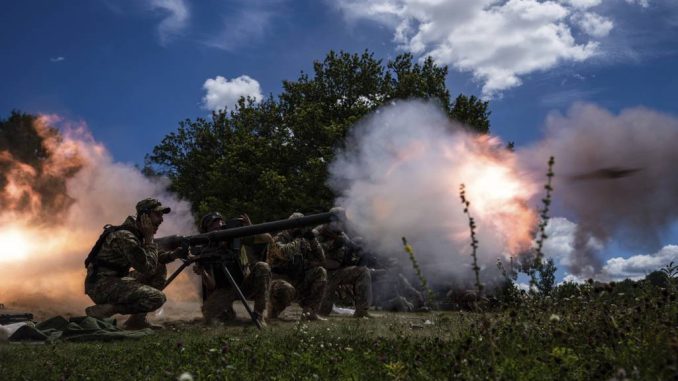
The U.S. military is now offering medical care to wounded Ukrainian troops at Landstuhl Regional Medical Center in Germany, the premier American hospital in Europe, Military Times has learned.
Defense Secretary Lloyd Austin on June 29 signed guidance allowing Landstuhl to treat up to 18 Ukrainian service members at a time, according to a Joint Staff memo that Military Times obtained on Monday.
News outlets including CNN and the Washington Post independently confirmed the contents of the memo. Spokespeople for the Office of the Secretary of Defense did not respond to a request for comment from Military Times on Tuesday.
“Landstuhl Regional Medical Center has not provided any medical treatment to Ukrainian Armed Forces personnel,” U.S. European Command spokesperson Lt. Cmdr. Russ Wolfkiel said in an email Wednesday. “Landstuhl Regional Medical Center remains postured and ready to support U.S. armed forces, NATO member countries and others as directed.”
Austin first proposed the idea in May and put it in writing about a month later, the memo said. Members of Congress in April urged the Pentagon to take that step to alleviate some of the workload on European hospitals.
Landstuhl became known as the medical hub for U.S. and allied troops who were wounded throughout the wars in Iraq and Afghanistan. However, the Pentagon doesn’t typically allow combatants from a war in which the U.S. is not directly involved to access American medical facilities.
Landstuhl is the largest American-run hospital outside of the U.S. and the only such facility in Europe that offers a full range of specialty care. It serves more than 205,000 U.S. troops and their families in Europe, plus troops from more than 50 foreign militaries who were hurt while serving in Afghanistan, Iraq, Europe, Africa and the rest of the Middle East and Southwest Asia.
RELATED
:quality(70)/cloudfront-us-east-1.images.arcpublishing.com/mco/I2V65QL7D5B5NETFVCEGYS26VM.jpg)
The Pentagon does make exceptions for people other than U.S. and allied troops to seek care at Landstuhl. Those situations include natural disasters or when another country can’t provide the lifesaving care someone needs, said Jim Townsend, a former deputy assistant secretary of defense for European and NATO policy who is now at the Center for a New American Security.
Treating wounded Ukrainians would bolster the underdog military’s morale as it begins its sixth month of war with Russia, he told Military Times on Tuesday.
“If you know that you’re going to potentially be taken to Landstuhl or somewhere else to be taken care of if you’re wounded, that gives you a lot more confidence in battle. … It’s a big deal for folks on the ground,” he said.
It’s unclear how wounded Ukrainians would travel hundreds of miles to western Germany. Townsend believes they could return to Germany on the same trains that are bringing combat materiel into Poland before they cross the border into Ukraine. They may also be medically evacuated from a neighboring country.
RELATED
:quality(70)/cloudfront-us-east-1.images.arcpublishing.com/mco/XCPZL55QWNAMXGJBOKBIVEDDMM.jpg)
“A train fitted out as a hospital would bring patients over that wouldn’t necessarily need something immediately, but might need plastic surgery to their face, or [have] missing limbs, or [need] some type of intricate surgery to remove shrapnel,” Townsend said.
More than 12,000 Ukrainian civilians have been wounded or killed in attacks following Russia’s invasion on Feb. 24. That is about as many in the past five months as were tallied in the five years after Russia annexed Ukraine’s Crimean Peninsula in 2014, the United Nations said on Monday. About 5,200 of them have died since February.
The government in Kyiv said in June that 100 to 200 Ukrainian troops were dying daily.
RELATED
:quality(70)/cloudfront-us-east-1.images.arcpublishing.com/mco/ZZXTSJXOFBBVXAJ27E3SJBEHMM.jpg)
Landstuhl may agree to bring in more than 18 patients as they get a feel for how treating Ukrainians will stretch their current capacity, Townsend added.
Townsend doubts that healing Ukrainians will do much to further provoke Russia, which has warned the U.S. and its allies against continuing to provide weapons to Ukraine. But he praised the decision to offer medical help as a step toward finding ways for more people across the continent to pitch in.
“Our example is important. I think if the European nations, allies or not, see what we’re doing, they might open up their hospitals as well,” he said.
U.S. involvement in the war has steadily increased since Russia invaded. The Biden administration has sent $8 billion in security assistance to Ukraine, though the country has sought longer range weapons that the U.S. has thus far not approved.
Rep. Mike Waltz, R-Fla., an Army National Guard officer, has also argued in recent days that the U.S. should also send advisers to the war-torn country, a move Moscow may view as a significant escalation.
”I don’t think anybody is advocating for any [American] military on the front line, but helping with logistics, planning those operations, integrating the intelligence is incredibly important right now,” Waltz told Fox News.
Rachel Cohen joined Air Force Times as senior reporter in March 2021. Her work has appeared in Air Force Magazine, Inside Defense, Inside Health Policy, the Frederick News-Post (Md.), the Washington Post, and others.



Be the first to comment